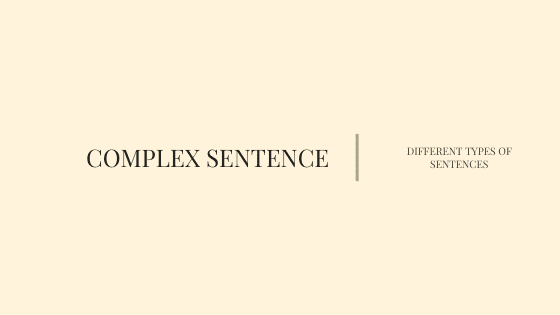Complex Sentence
A Complex sentence is one classification of the Different Types of Sentences. A Complex sentence is a sentence that is a combination of one main idea and one or more dependant idea.
In other words a complex sentence is a combination of one independent clause and one or more dependent clause.
Independent clause in a complex sentence behaves as a simple sentence and consists of a subject and a predicate.
Dependent clause is a clause which depends upon the independent clause.
Complex Sentence Example 1:
I greet my mother before I go to school.
Let’s understand the example:
I greet my mother: Independent Clause
Before I go to school: Dependent Clause

Complex Sentence Example 2:
When we buy his birthday cake, we have to make sure it’s lemon.
We have to make sure it’s lemon: This sentence can stand alone and have a meaning of its own so we call it as an independent clause.
The sentence is relying on some information which is not provided but it does stand independent as it has a subject, verb and predicate.
When we buy his birthday cake: This sentence does not stand of its own or it does not convey any information alone. So we call it as a dependent clause.
We buy his birthday cake would have been an independent clause as it has a subject and a predicate. But, because of the subordinating conjunction WHEN, it became a dependent clause.
When we divide sentences as per their structure, among 3 different types of sentences this type is said as complex due to its structural behaviour of having one independent clause and one or more dependent clause.
With one independent clause you can keep on adding more and more dependent clauses.
Above example will still be a complex sentence if we add one more dependent clause to it.
When we buy his birthday cake, we have to make sure it’s lemon, because it is his favorite flavour.
“Because it is his favorite flavour”, is also a Dependent Clause and the above sentence is a complex sentence with two dependent clauses and one independent clause.
Complex Sentence Example 3:
Although our tent was zipped up, the sound from distant mountain frightened us.
It is not necessary that the dependent clause comes before or after the independent clause. They do not have to follow the same order of writing. Either the dependent clause or the independent clause can come first.
Thus the above sentence could be written as;
The sound from the distance mountain frightened us even though our tent was zipped up.
But when the dependent clause comes first, a comma should be put at the end of the clause. (Vide the formerly written sentence)
In the above examples we have used the subordinating conjunctions, although and even though, to form complex sentences.
Subordinating Conjunction plays a vital role in forming complex sentences. It works as a connector between independent clause and dependent clause. It also makes the sentence more meaningful.
Subordinating Conjunctions come at the beginning of the independent clauses. Most commonly used Subordinating Conjunctions are:
- Since
- Because
- After
- While
- If
- Although
- Before
- Until
- Unless
- When
- That
Some more examples of complex sentences are diagrammatically given hereunder:

